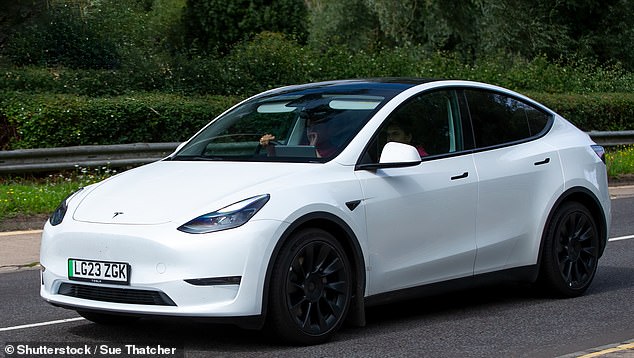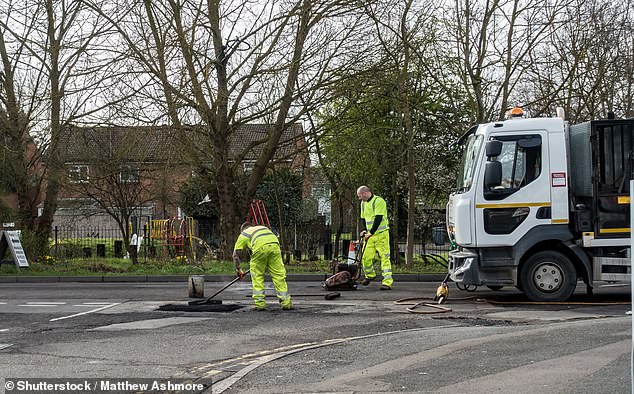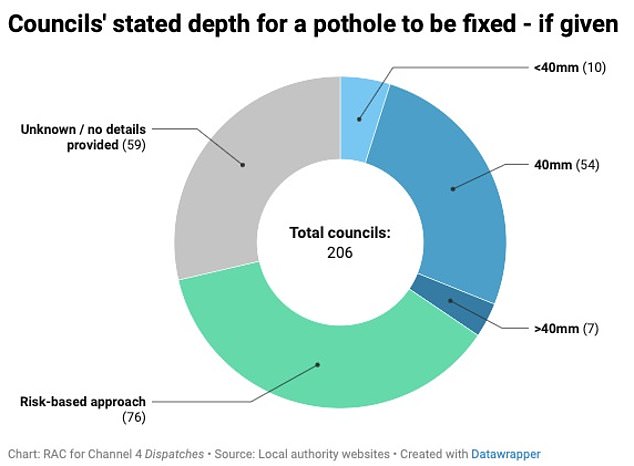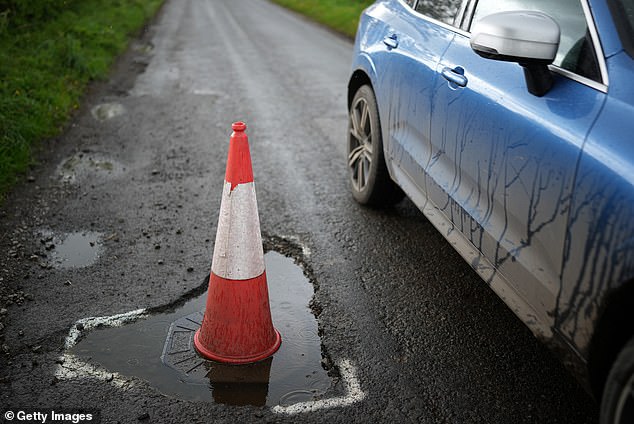
A leading road surface company wants to put an end to speculation as to whether electric vehicles are the cause of an increase pothole plighting the nation’s roads.
The Asphalt Group – one of the UK’s largest road surface treatment companies – has called for a better long term solution to the on-going issue of Britain’s crumbling road network.
It comes after some have claimed that the additional bulk of EVs – especially hulking SUV versions – are the biggest contributor to our cratered routes.

The Asphalt Group – one of the UK’s largest road surface treatment companies – wants to put an end to speculation as to whether electric vehicles are the cause of an increase pothole plighting the nation’s roads

A recent report by the trade body Asphalt Industry Alliance (AIA) put the bill for pothole-related payouts at £15.2million
The group is categorically clear that the switch to electric is not responsible for the poor quality of our roads.
Taking a fighting stance on the subject, Stephen Cooke, Asphalt Group MD, said: ‘Let’s be crystal clear, EVs are not the cause of the current state of the UK’s roads.’
So what is causing the embarrassingly poor condition of our streets and busy routes?
‘The real reason is a lack of investment in the solutions of the future, and a lack of awareness of what’s available,’ Cooke explains.
‘Traditional ‘sticky plaster’ pothole solutions are simply unacceptable, we need to be thinking bigger picture. Prevent, reinforce and spray treatment is the way forward – not just filler and hope.’
The group believes a more affordable, lower environmental impact and longer lasting road network can be obtained if road surface and maintenance companies and the government work together.
But to do this the current blame narrative needs to move away from EVs – something Bill Esterson, Shadow Road and Transport Minister reiterates: ‘There are 100 times as many potholes as there are craters on the moon.
‘Rather than looking for conspiracy theories and scapegoats, we need a plan to fix the roads. That means replacing the sticking plasters and gimmicks with a sustainable approach and long-term resurfacing and prevention in their place.
‘The UK has a £16.3 billion backlog of repairs, this is simply unacceptable.’

A recent investigation found no consistency with how local authorities determine when a pothole needs to be fixed. A variety of different approaches were given by 206 local councils when identifying and repairing potholes
This is Money recently reported how the UK’s pothole epidemic is intensifying with the RAC attending 10 per cent more breakdowns resulting from motorists driving through potholes than a year ago.
Some 27,205 callouts to breakdowns due to poor road surfaces in the UK were received by the RAC in the year to the end of March. That compares with 24,906 during the previous 12 months.
On top of this, Channel 4’s Dispatches programme and the RAC found that local authorities are taking wildly polarised approaches to classifying potholes, and what determines whether they get fixed or not.
The probe found that a third of councils will only fix potholes when they reach a specific depth, irrelevant of how wide they are.
This means many dangerous potholes go unrepaired, posing a continuous risk to road users.

Out of 206 councils approached by the RAC and Dispatches, just 76 (37%) take a ‘risk-based approach’ to deciding which potholes to fix and how quickly
While the problem with UK roads is nothing new, myths put the blame on electric vehicles – specifically their weight.
A combination of misleading national speculation from the press about how the weight of EVs will affect roads and bridges and MP’s querying the need for tests to determine this has led to a general concern that our roads won’t be able to deal with the uptake in EVs.
The RAC counteracted ‘misguided’ information, stating: ‘Any attempt to say the weight of EVs is responsible for a decline in the quality of our roads is a distraction from the reality that our roads have been neglected for too long.’
In 2022 University of Edinburgh published a research paper called Hidden cost of road maintenance due to the increased weight of battery and hydrogen trucks and buses – a perspective.
Earlier this year, The Guardian pointed out that Edinburgh University’s analysis didn’t carry out real-world tests, and the paper stated any extra wear is ‘overwhelmingly caused by larger vehicles – buses, heavy goods vehicles’ and that road wear from cars and motorcycles ‘is so low that this is immaterial’.
Today FairCharge founder Quentin Willson said: ‘Blaming EVs for potholes is laughable since they’re only around 3 per cent of all vehicles on UK roads.
‘I’m pleased that road repair experts, Asphalt Group, and the Shadow Minister for Roads, Bill Esterson, have joined FairCharge’s calls for facts and accuracy in the exaggerated media reports linking the weight of EV batteries to road damage.
‘Instead, we should focus on how to create long term solutions for fixing the worst levels of potholes that the asphalt industry has seen for 29 years.’
Some links in this article may be affiliate links. If you click on them we may earn a small commission. That helps us fund This Is Money, and keep it free to use. We do not write articles to promote products. We do not allow any commercial relationship to affect our editorial independence.






